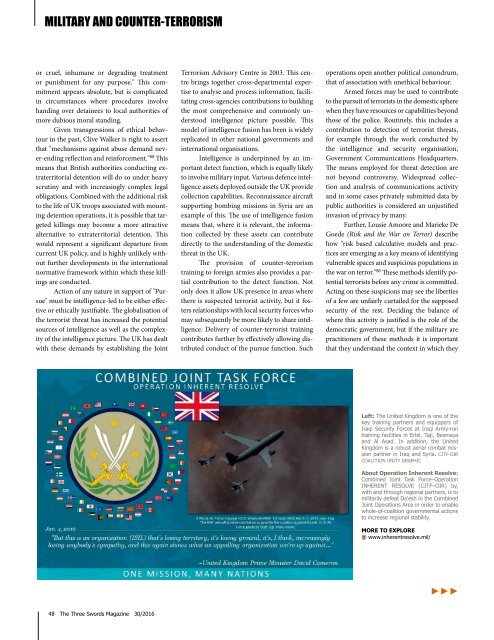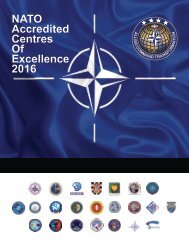TRIDENT ISSUE
7201_JWC_May2016_Magazine_ORIG_Low
7201_JWC_May2016_Magazine_ORIG_Low
Create successful ePaper yourself
Turn your PDF publications into a flip-book with our unique Google optimized e-Paper software.
MILITARY AND COUNTER-TERRORISM<br />
or cruel, inhumane or degrading treatment<br />
or punishment for any purpose." This commitment<br />
appears absolute, but is complicated<br />
in circumstances where procedures involve<br />
handing over detainees to local authorities of<br />
more dubious moral standing.<br />
Given transgressions of ethical behaviour<br />
in the past, Clive Walker is right to assert<br />
that "mechanisms against abuse demand never-ending<br />
reflection and reinforcement." 55 This<br />
means that British authorities conducting extraterritorial<br />
detention will do so under heavy<br />
scrutiny and with increasingly complex legal<br />
obligations. Combined with the additional risk<br />
to the life of UK troops associated with mounting<br />
detention operations, it is possible that targeted<br />
killings may become a more attractive<br />
alternative to extraterritorial detention. This<br />
would represent a significant departure from<br />
current UK policy, and is highly unlikely without<br />
further developments in the international<br />
normative framework within which these killings<br />
are conducted.<br />
Action of any nature in support of "Pursue"<br />
must be intelligence-led to be either effective<br />
or ethically justifiable. The globalisation of<br />
the terrorist threat has increased the potential<br />
sources of intelligence as well as the complexity<br />
of the intelligence picture. The UK has dealt<br />
with these demands by establishing the Joint<br />
Terrorism Advisory Centre in 2003. This centre<br />
brings together cross-departmental expertise<br />
to analyse and process information, facilitating<br />
cross-agencies contributions to building<br />
the most comprehensive and commonly understood<br />
intelligence picture possible. This<br />
model of intelligence fusion has been is widely<br />
replicated in other national governments and<br />
international organisations.<br />
Intelligence is underpinned by an important<br />
detect function, which is equally likely<br />
to involve military input. Various defence intelligence<br />
assets deployed outside the UK provide<br />
collection capabilities. Reconnaissance aircraft<br />
supporting bombing missions in Syria are an<br />
example of this. The use of intelligence fusion<br />
means that, where it is relevant, the information<br />
collected by these assets can contribute<br />
directly to the understanding of the domestic<br />
threat in the UK.<br />
The provision of counter-terrorism<br />
training to foreign armies also provides a partial<br />
contribution to the detect function. Not<br />
only does it allow UK presence in areas where<br />
there is suspected terrorist activity, but it fosters<br />
relationships with local security forces who<br />
may subsequently be more likely to share intelligence.<br />
Delivery of counter-terrorist training<br />
contributes further by effectively allowing distributed<br />
conduct of the pursue function. Such<br />
operations open another political conundrum,<br />
that of association with unethical behaviour.<br />
Armed forces may be used to contribute<br />
to the pursuit of terrorists in the domestic sphere<br />
when they have resources or capabilities beyond<br />
those of the police. Routinely, this includes a<br />
contribution to detection of terrorist threats,<br />
for example through the work conducted by<br />
the intelligence and security organisation,<br />
Government Communications Headquarters.<br />
The means employed for threat detection are<br />
not beyond controversy. Widespread collection<br />
and analysis of communications activity<br />
and in some cases privately submitted data by<br />
public authorities is considered an unjustified<br />
invasion of privacy by many.<br />
Further, Lousie Amoore and Marieke De<br />
Goede (Risk and the War on Terror) describe<br />
how "risk based calculative models and practices<br />
are emerging as a key means of identifying<br />
vulnerable spaces and suspicious populations in<br />
the war on terror." 56 These methods identify potential<br />
terrorists before any crime is committed.<br />
Acting on these suspicions may see the liberties<br />
of a few are unfairly curtailed for the supposed<br />
security of the rest. Deciding the balance of<br />
where this activity is justified is the role of the<br />
democratic government, but if the military are<br />
practitioners of these methods it is important<br />
that they understand the context in which they<br />
Left: The United Kingdom is one of the<br />
key training partners and equippers of<br />
Iraqi Security Forces at Iraqi Army-run<br />
training facilities in Erbil, Taji, Besmaya<br />
and Al Asad. In addition, the United<br />
Kingdom is a robust aerial combat mission<br />
partner in Iraq and Syria. CJTF-OIR<br />
COALITION UNITY GRAPHIC<br />
About Operation Inherent Resolve:<br />
Combined Joint Task Force‒Operation<br />
INHERENT RESOLVE (CJTF‒OIR) by,<br />
with and through regional partners, is to<br />
militarily defeat Da'esh in the Combined<br />
Joint Operations Area in order to enable<br />
whole-of-coalition governmental actions<br />
to increase regional stability.<br />
MORE TO EXPLORE<br />
@ www.inherentresolve.mil/<br />
►►►<br />
48 The Three Swords Magazine 30/2016



